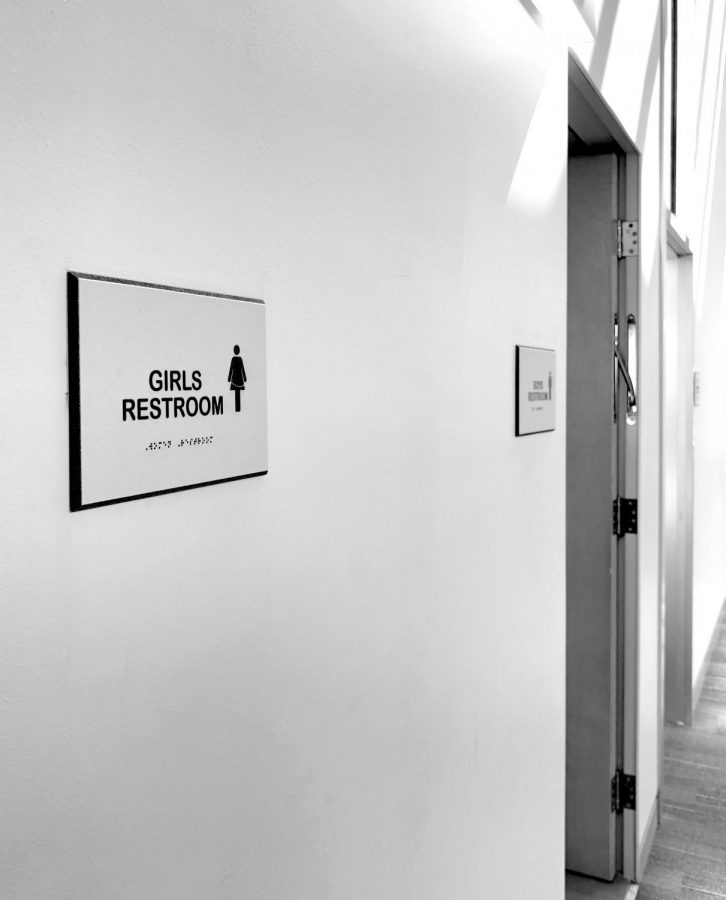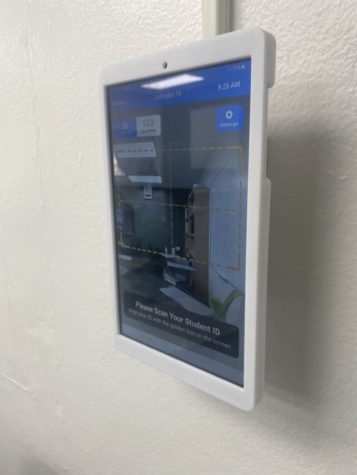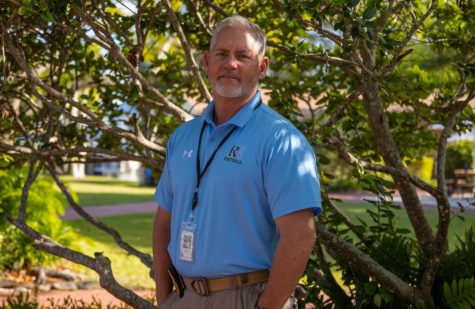Bathroom sign changes in Cameron spark discussion about transgender inclusivity
Along with the new offices and classrooms, there was a noticeable addition to the renovated second floor of Cameron when school opened: two new “unisex” student bathrooms. Within a few weeks of operation, however, and without immediate explanation to the students, those restrooms had been relabeled as gender-specific.
Emma Fraser ’20, President of the Gender Sexuality Association (GSA), said it felt as if the administration “just forgot about us.”
With Timken being demolished soon, leaving the campus without gender-neutral restrooms for up to 2 years, several students sought an explanation to this “upsetting and confusing” situation, as Fraser described it.
Head of School Ms. Penny Townsend made it clear that the intent was not to undermine the inclusivity of the campus. She said the switch occurred to try to isolate a plumbing issue that arose once students started using the new bathrooms.
“The intention was to have unisex bathrooms,” said Ms. Townsend, but in order to solve the plumbing issue, the contractors decided to revert back to gender-specific restrooms for the time being. However, that reasoning was not directly communicated to students.
According to Ms. Townsend, the issue that arose was that the pipes could not handle the increased amount of paper products being flushed. Within the next few weeks, the current pipes, which are old and small, will be replaced with larger, modern plumbing to prevent an issue from occuring again.
“When we do the permanent signage, it will be back to unisex,” Ms. Townsend said. Still, although the recent switch is only temporary, the larger dialogue about accommodating transgender students remains.
Two years ago, the GSA and Diversity Council, along with then-Dean of Students Dr. Josh Stone, successfully advocated for the school to convert all of its single-stall bathrooms — in Timken, Cameron, and the Cafeteria — to gender-neutral bathrooms. With the loss of Timken and the fact that the cafeteria bathroom is reserved for faculty and staff, the conversion of the Cameron restrooms would have meant the absence of gender-neutral facilities on campus until the new STEM center is constructed.
Mr. Michael Laughlin, the current faculty sponsor of the GSA, noted the importance of all-gender bathrooms to students. “Having gender-neutral bathrooms . . . sends a strong message of inclusion to those who are transgender or gender nonconforming.”
As Timken lives out its last days before its destruction, Mr. Laughlin also emphasized that “we have to be careful with how we deal with the gender-neutral bathrooms . . . they should be held in high regard.”
In addition to the bathroom change a few years ago, several other strides have been made for LGBTQ+ visibility on campus. With the GSA working with the administration to create all-gender spaces in the new STEM building, and bringing Pride Day celebrations to campus, inclusivity for the LGBTQ+ community has been rising on the community’s radar.
Hunter Bermudez ’10, a transgender man who served on the GSA while at RE and who is also an advocate for transgender rights and awareness, emphasized the importance of all gendered restrooms.
“Going to the bathroom is a basic human necessity that should never be restricted for any person,” he said in an e-mail interview. “Many transgender individuals have experienced trauma, which affects our mental health condition. Restricting bathroom use adds an enormous amount of daily stress to a person’s life and can hinder their ability to focus on school or work or even basic everyday tasks.”
Mr. Bermudez wrote of his own experiences regarding bathrooms, saying that in college, “Sometimes I would walk across campus, far from my class, just to comfortably use the restroom. Other days, if I didn’t have enough time, I would hold it until I was able to go back to my dorm. My own anxiety . . . still persists around public bathrooms.”
Bermudez also mentioned the threat of anxiety to transgender individuals, saying “increased anxiety and the shame of being dehumanized can lead to depression. . . . Obviously, the bathroom is not the whole issue and not the most serious, but it does have a much greater impact on the lives of transgender individuals than someone outside of that experience might suspect.”
Ms. Townsend said that the RE Board of Trustees is currently constructing a policy, with the help of an outside consultant, to address the challenges facing trans students in the RE community.
Bermudez further stressed the importance of formulating an equitable policy for transgender inclusion, saying, “As an individual of trans experience . . . policy directly affects my daily life, and at times, my humanity. My only recommendation would be: please don’t wait.”
Fraser said that, as the school formulates this policy, the GSA hopes to strengthen the dialogue between the administration and the LGBTQ+ community throughout this process.
Holly Steinberg '19 was an editor of The Catalyst between 2018-2019.











